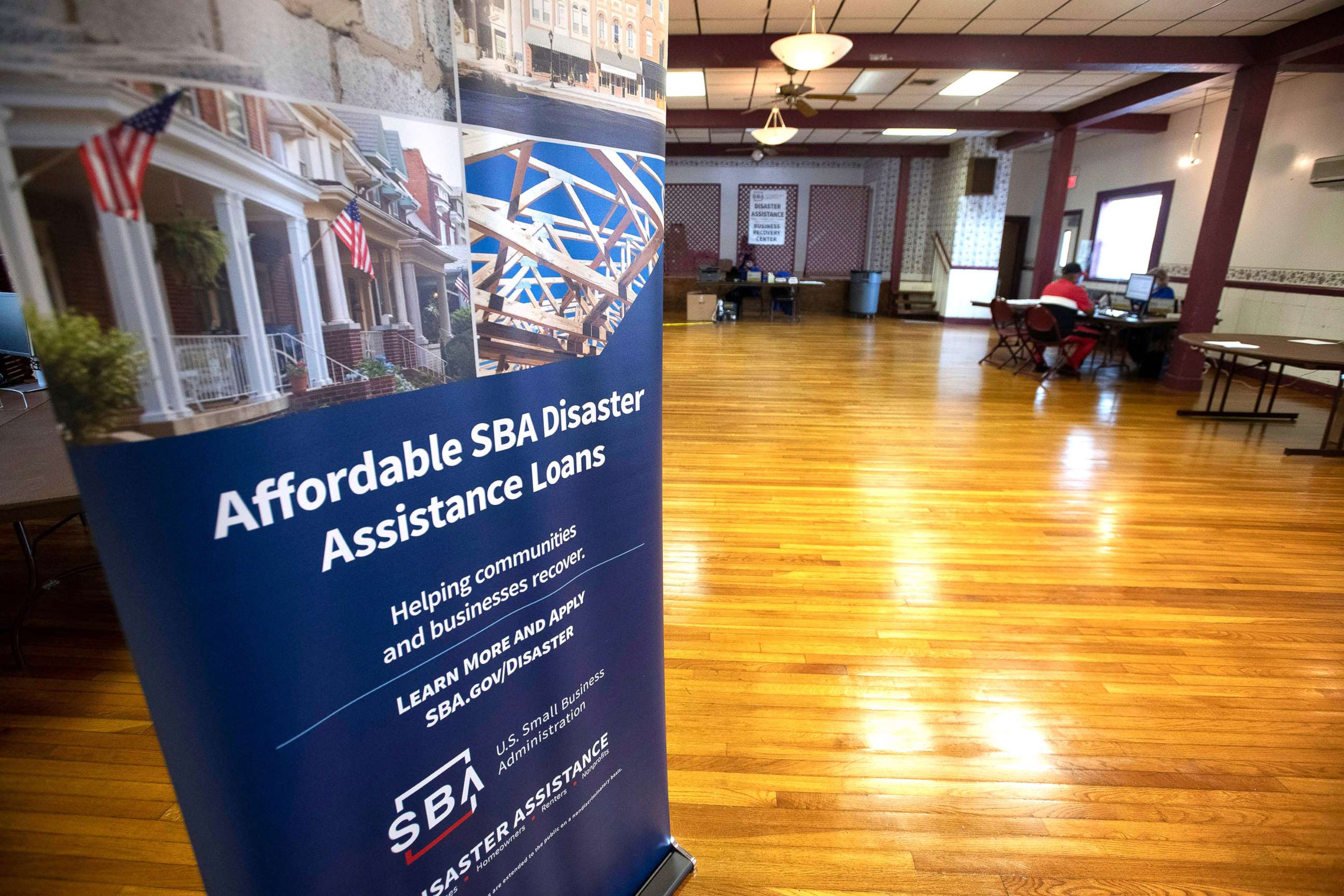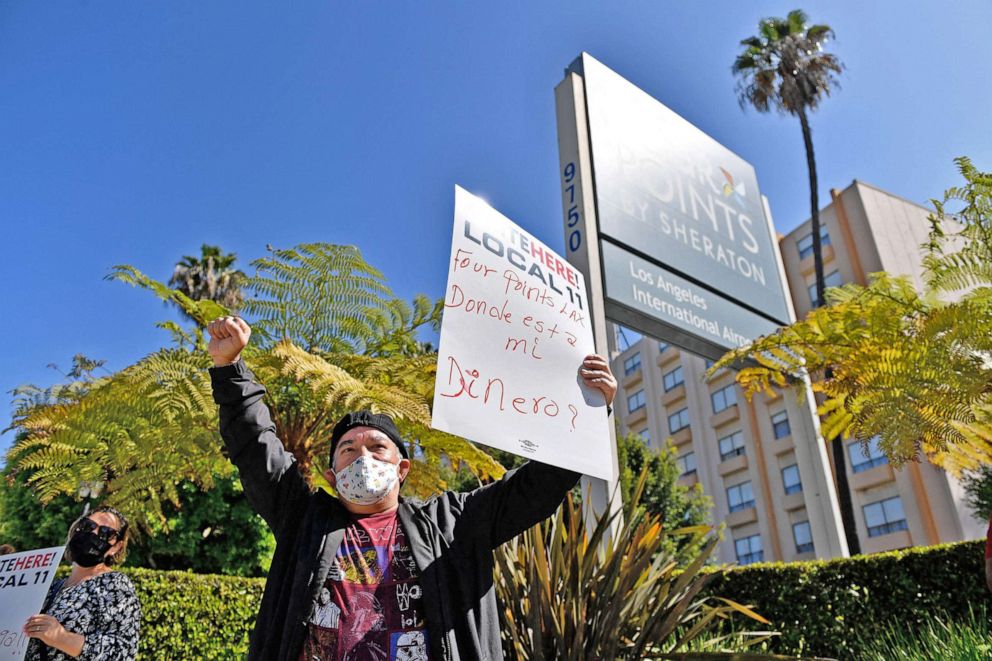'Unprecedented' fraud penetrated rollout of COVID-19 small business loans, watchdog warns
The SBA inspector general says "lowered guardrails" left the program vulnerable.
At the dawn of the COVID-19 pandemic, when offices and restaurants began shuttering, the federal government scrambled to keep small businesses afloat -- ultimately spending over a trillion dollars to help protect the American Dream for millions of workers and business owners.
But even before the first checks went out, alarm bells went off.
The person ringing those bells the loudest was Hannibal "Mike" Ware, the inspector general of the Small Business Administration. The veteran internal watchdog says he participated in a series of meetings with Trump administration officials and SBA program analysts that were laced with "testy exchanges" about how to expeditiously dispense funds without leaving them vulnerable to fraudulent claims.
His warnings went unheeded, Ware said, and the fallout has taken him "from a black-haired guy to a gray-haired guy."
"My frustration level was extremely high," Ware told ABC News in a recent interview. And now, a year and half later, he said "the magnitude of the fraud we are seeing is unheard of -- unprecedented."
As small businesses emerge from the pandemic, the Paycheck Protection Program (PPP) and the Economic Injury Disaster Loans (EIDL), two key relief programs passed as part of the congressional CARES Act, are winding down. But for all the jobs they've rescued, their legacies may be tarnished by unprecedented amounts of fraud -- a reality that experts fear may impair efforts to pass future emergency relief programs.
"In terms of the monetary value, the amount of fraud in these COVID relief programs is going to be larger than any government program that came before it," Ware said.
All government programs suffer some amount of fraud, experts say. And emergency programs are even more susceptible, due to the inherent tension between the pressure to approve loans quickly and the need to screen applications and maintain other fraud-prevention measures that may prolong the process.
In an October 2020 report, Ware's office found that "to expedite the process, SBA 'lowered the guardrails' or relaxed internal controls, which significantly increased the risk of program fraud."
A senior SBA official in the Biden administration agreed with Ware's analysis, noting that "it should not be an expectation that we need to sacrifice speed for certainty -- you can do both."
"The story of 2020 for both PPP and EIDL is the fact that the previous administration's leadership did not have sufficient controls in place for determining individual identity or business identity," the official said. "Different choices could have absolutely been made to limit fraud vulnerabilities."
"With limited staff, few technological tools to conduct prepayment verification, and crushing need, SBA and other agencies abandoned many traditional controls and simply approved applicants with little or no verification of self-reported information," according to Linda Miller, the former deputy executive director of the Pandemic Response Accountability Committee, a government task force established as part of the CARES Act.

"Best practice calls for due diligence at the front end to avoid making the fraudulent or improper payment in the first place," Miller wrote in June, after leaving PRAC. "But in the rush to quickly distribute pandemic relief, we failed to do that and so now we are chasing [funds that were fraudulently granted] ... but the recovered funds will be a fraction of what was stolen."
Ware said this is precisely what his office sought to avoid. Before PPP and EIDL were even finalized, the SBA inspector general's office submitted three reports to the SBA "detailing the importance of up-front controls," according to Ware. During the testy exchanges in the spring of 2020, he said he warned the SBA to "pump the brakes" on the process.
"Fraudsters are going to do what fraudsters are going to do," Ware said. "But the upfront controls mitigate exposure to fraud, and doing so would have saved taxpayers a whole lot of heartache on the back end. Unfortunately, the heartache was not avoided because of the way these programs were implemented up front."
Jovita Carranza, the former SBA administrator who resigned when President Trump left office, could not be reached by ABC News for comment. Last October, in a letter responding to Ware's report, Carranza wrote that the inspector general "failed to acknowledge the enhanced and effective system controls and validations that SBA is using" to weed out fraudulent applications and "grossly overstates the risk of fraud, waste and abuse."
Carranza's successor as SBA administrator -- Biden nominee Isabella Casillas Guzman -- has said that "reducing the risks of fraud and waste and abuse" in the distribution of relief loans and grants is a top priority. She said a series of steps implemented in December -- including up-front verifications and tax information from applicants -- has already produced "a sharp decline" in fraud, and that she is working closely with Ware to further improve safeguards and vigorously track down and recover prior fraudulent dispersals.
Ware agreed that controls put in place late last year helped curb fraud, but said the efforts were too little, too late.
"By then, well, you already know how much money was gone," he said. "A lot of money was out."
Among the relief programs, the previous administration's EIDL rollout has attracted particular scrutiny. James W. Cooper, a former federal prosecutor who is now with the law firm Arnold & Porter, called the program a "fraud magnet," citing a provision that allowed recipients to receive up to $10,000 up front "with essentially no strings attached."
"That money is gone," Cooper said.
But that hasn't kept Ware from trying to recover it. His investigative efforts have resulted in 307 indictments, 205 arrests, and 69 convictions tied to PPP and EIDL fraud, resulting in the recovery of more than $600 million so far.
That figure, however, reflects only a fraction of what experts believe was defrauded. Of the more than $1 trillion distributed, Ware and others estimate that more than 5% of transactions were fraudulent -- a stunning rate that would suggest tens of billions of dollars lost.

The first charges of PPP fraud arrived just weeks after the program launched, Ware said, and will continue for years to come. Fraudsters have used an array of strategies to illegally obtain the relief funds, including identity theft and creating fake companies to submit loan applications.
Those charged include a former "Love & Hip Hop: Atlanta" reality TV star accused of defrauding PPP to the tune of $2 million, and a former New York Jets football player who allegedly obtained a $1.2 million PPP loan and spent much of the money on jewelry and items from Gucci and Dior. Other fraudsters are accused of spending their spoils on Tesla stock and a 40-foot catamaran sailboat.
A NASA executive recently pleaded guilty to submitting fraudulent loan applications to PPP and EIDL seeking over $350,000, then spending the money on a variety of personal expenses including a swimming pool and a dog breeder. Prosecutors said the executive "treated COVID-19 relief programs as a personal piggy bank."
For those found guilty, prosecutors are seeking harsh penalties; last week, a Texas man who submitted false documents and received more than $17 million in PPP loans was sentenced to 11 years in prison and ordered to pay back $17 million in restitution. He had used the illicit funds to purchase multiple homes and a fleet of luxury cars, including a Bentley convertible, a Corvette Stingray and a Porsche Macan.
But experts fear those audacious and high-dollar cases are just the tip of the iceberg -- and they warn that as time goes on, investigators will uncover even more complex scams.
"This first round of prosecutions is targeting the low-hanging fruit -- clear-cut cases of fraud involving large sums of money that are relatively easy to trace," said Cooper, the former federal prosecutor. "What will be interesting to see is whether investigators eventually turn their attention toward more nuanced and sophisticated instances of fraud."
One notable challenge for investigators will be to pin down the organizers of large-scale schemes that have been a pervasive source of fraud. This includes schemes in which a small number of individuals enlist others to submit a high volume of low-dollar loan requests and then take a cut of the proceeds -- a sort of fraud crowdsourcing, experts said.
"In many cases, individuals obtained those loans at the behest of a person or persons who were seeking multiple advances using straw applicants," Cooper said. "It will be very difficult for investigators to identify the real perpetrators."
These complex cases require more time and energy to investigate, straining resources that are already stretched thin. Brandon Brockmyer, the director of research at the Project on Government Oversight, a nonprofit watchdog group, said investigators will likely have to prioritize the most egregious cases.
"The official oversight bodies are trying to slice and dice the data to determine where to put their time and resources, because they are overwhelmed," Brockmyer said. "These are huge numbers of transactions. They have no choice but to be strategic about where they're looking."
In light of the challenges, Ware anticipates the investigative work will go on for years. And experts are growing increasingly concerned that there may be more at stake than unrecovered money.
"It comes back to the public's trust in government to administer programs of this scale," said Brockmyer. "The rate of fraud in these COVID relief programs will have an impact the next time a big emergency rescue program is necessary."




